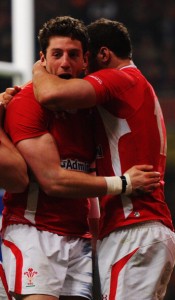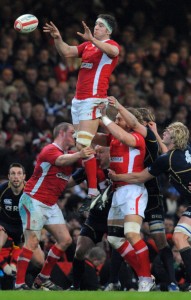By Paul Williams
WALES BEAT Scotland 27-13 in Cardiff on Sunday. They’re now two from two in the Six Nations and heading towards a Triple Crown showdown in Twickenham. Let’s take a look at the plusses and minuses of Wales’ performance – and there will be more Welsh analysis throughout the rest of the championship.
Lydiate is a dictator
Dan Lydiate may not be the most glamorous of players. He doesn’t attract the sponsorship deals with multi-blade razor companies or boot deals with multinationals, but sometimes his performances have an impact beyond the game in which he is playing. At his best he seems to change the rules and central tenets of rugby. Lydiate made 11 tackles against Scotland. Whilst this may not be the highest tackle count in the Welsh team (Toby Faletau led with 17), Lydiate’s incredible line speed and range of ankle, waist and wrap tackles dictate where the ‘tackle-line’ is. Rugby’s coaching manuals suggests that the tackle-line sits just behind the midpoint of a ruck, maul or scrum. Yet Dan Lydiate seems to push the tackle-line back a yard or two. He appears to be permanently offside, yet rarely is. Dictating where the tackle-line is may seem irrelevant in modern rugby. Indeed you rarely hear it, as the ‘gain-line’ is rugby’s poster boy. But the tackle-line dictates just how far you have to travel in order to get to the gain-line, and whilst current defensive alignments already make it hard to get to the gain-line, Lydiate’s defensive capabilities make it even harder.
Cuthbert proves the doubters wrong
Alex Cuthbert’s selection against the Irish may have raised an eyebrow amongst those who hadn’t seen him play (he has scored four tries in five Heineken Cup games for Cardiff Blues), but his selection against England in a fortnight’s time won’t come as such a shock. Cuthbert was immensely effective against Scotland. His straight line speed and 16st 6lb frame saw Greig Laidlaw and Nick de Luca turned into speed bumps. His kick chase was relentless and his try-scoring pass to Leigh Halfpenny not only showed an ability to pass simply off his wrong hand, it also showed a distributive awareness that few wingers have. The rugby world may marvel at George North, but Cuthbert could become one of Warren Gatland’s most lethal assets. To use boxing parlance, Gatland can now dazzle them with the left and smack them in the face with the right.
Wales have two packs of forwards
Having not had a genuine pack of forwards for over 20 years, Wales now appear to have the makings of two. Much will be made of the Scottish pack’s performance at the Millennium Stadium, and rightly so. They generated 61% possession and anchored 59% of territory. They also had perfect lineout and scrum stats. But it is worth remembering that Wales essentially fielded a second-string eight – Matthew Rees, Alun Wyn Jones, Luke Charteris, Bradley Davies and Sam Warburton were all unavailable for selection. Wales weren’t just playing without five first-choice forwards; some of those who were selected played out of position. Ryan Jones may have become increasingly familiar with playing lock at the Ospreys, but he is far more comfortable at six or eight. And whilst Aaron Shingler must have been delighted to receive his first cap, he would rather it had been at blindside. It may be too early to talk of a genuinely deep pool of forwards, but Wales are no longer splashing in the shallows.
Wales missed Warburton
Sam Warburton pulled out of the Scotland game after failing a late fitness test. His replacement was the tall, sinewy, Aaron Shingler. Shingler performed ably, carrying the ball 11 times and making 13 tackles, but Wales missed Warburton enormously. It is nothing to be ashamed of. The All Blacks aren’t the same without McCaw, The Wallabies without Pocock, and the Boks without Burger or Brussow. Most noticeable were the lack of ‘offensive’ turnovers at the breakdown. We’re all used to seeing Warburton emerging from the ruck to back-slapping team-mates and rapturous applause – Warburton’s offensive turnovers are often reminiscent of a fireman plucking a missing dog from a pile of rubble. But whilst the heroics were certainly missed, it was Warburton’s dirty work which left a void. Warburton doesn’t just slow ‘their’ ball down, he speeds Welsh ball up. In Warburton’s absence, Ross Rennie arrived at everything first and his sticky fingers were all over everything. Warburton’s dead leg can’t come to life quick enough.
The lineout remains a problem
Wales’ lineout stats don’t look too bad. They won 83.3% of their own ball, which is an improvement on the 71.4% they won in Dublin. But don’t be fooled. Winning possession isn’t what counts; it’s the quality of possession that matters. Sadly there isn’t a stat for that, if there was, Welsh fans wouldn’t like it. Wales lost the most important lineout of the game: their first. The call was made and Huw Bennett launched the ball past Wales’ two recognised jumpers, Ryan Jones and Ian Evans, and instead targeted Faletau at the back. Wales’ technical deficiencies are often called into question when discussing their lineout frailties, but their first lineout was clearly a case of poor decision-making. With a notoriously fragile lineout, why choose to execute the most difficult of all the lineout moves on your first call? The Welsh lineout improved throughout the game, but it remains an issue that must be resolved. Wales require a lineout that their back-line can trust. They require a lineout that allows them to sit deep on their own ball, safe in the knowledge that they won’t have to make up the 30-yard gap between them and the opposition’s back-line in the event of the ball being stolen.








